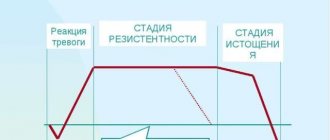.
Every day a person faces many stressful situations. There is no escape from this, so psychology offers people ways to avoid or deal with stress.
What stressors surround a person and how a person reacts to them determines the overall picture of his psychophysical and emotional state.
Types of stress - good and bad
The principle of action of stressors on the body
Stress is the body's reaction to stimuli, called stressors. In psychology, there are such concepts as beneficial and harmful stress. They are distinguished by their effects on the human body and by the consequences that arise after some time.
Distress has a destructive effect on the nervous system and internal organs of a person. It is this that causes depression, chronic diseases and mental disorders. In addition to it, there is also eustress - a positive form of stress. It does not have a destructive effect and is often associated with joyful moments in a person’s life.
Stressors can be any factors that surround a person in everyday life.
Some have a short-term and minor effect on the subject, while others act for a long time, which leads to chronic manifestations of stress.
One way or another, it is impossible to completely get rid of them. In order to reduce the impact of stressors on the body, psychologists have developed special techniques and training to increase the stress resistance of individuals.
Stages of stress development
What is a stressor?
Stress factors lead to emotional burnout of a person. This is a long-term adverse effect that has a strong impact on the psyche. This meaning can be assigned by the person himself, or the body classifies it this way through the lower sensory mechanisms of the brain, the digestive and metabolic system. The degree of manifestation depends on the level of stress resistance.
External factors include:
- Environmental pollution;
- Drinking alcoholic beverages and smoking;
- Prolonged exposure to the sun and burns;
- High level of responsibility and workload;
- Personal problems;
- Emotional shock.
Internal factors include:
- Various food allergic reactions;
- Autoimmune diseases;
- Accelerated metabolism;
- Increased cholesterol levels;
- Low blood sugar or vice versa;
- Hormonal disbalance;
- Unbalanced diet;
- Depressive state caused by insufficient amounts of minerals in the body;
- Sleep disturbances;
- Insomnia;
- Low level of self-esteem;
- Long-term chronic diseases.
Classification of stressors according to L. V. Levi
According to the works of L.V. Levi, a person is constantly in a state of stress. This is due to any external influence or processes within the body. Levy divides stressors into two types: short-term and long-term.
Short-term stressors
They may occur suddenly or recur over a period of time. They have a minor effect on the nervous system and cannot become chronic. These include:
- Failures, mistakes, mistakes. Signals can also come when reminded of a stressor. If a person independently remembers a past bad experience or someone reminds him of it, then the intensity of stress can be as strong as at the time of the event. In general, the severity of the reaction to memories decreases over time.
- Noise, bright light, unpleasant swings, temperature changes. The impact of external stimuli on an individual while he is performing any work leads to a decrease in concentration.
- Fear, fright. Expectation and fear of physical pain, fear of hurting others, criticism or ridicule of oneself lead a person to a state of stress. If a person experiences these feelings over a long period of time, they become long-term stressors.
- Discomfort. The influence of external factors on the human body, such as heat, cold, dampness, etc., causes a reaction of the defense system, which is completely normal.
- Speed, haste, high tempo. When a subject is rushed, forced to do something faster than he is accustomed to, he is exposed to a stressor.
Long-term stressors
Their long-term exposure not only makes adjustments to a calm and measured life, but can also significantly affect the subject’s health.
Stressor - military service
Long-term ones include:
- Complete restriction or isolation. For example, imprisonment, total parental control, serving military service or a regular diet. Any infringement of the body in its usual needs affects the nervous system.
- Dangerous work or extreme lifestyle. People who carry out their duties at risk with their lives are exposed to long-term stressors. Love of extreme sports or adrenaline addiction contribute to the manifestation of stressors.
- Background exposure. With the constant need to resist in any area of life, a person suffers in his psychophysical state. The reason for this may be enmity with some entity or military action.
- Overwork, prolonged performance of the same type of work. Actions that lead to mental or physical fatigue can significantly affect the functioning of organs and systems.
In order to reduce the influence of surrounding stimuli, you need to avoid collisions with them or change your attitude towards them.
Impact of different types of stressors
What is stress from a psychological point of view?
Types of communication in psychology - what they include, its functions
There is a tendency among ordinary people to equate psychological stress with nervous tension. This is partly due to the meaning of the word in English – “tension”. However, this type of stress is not just strong mental anxiety. Hans Selye, who developed the theory of stress, understood it as a general adaptation syndrome consisting of three stages. Their brief description:
- Anxiety reaction when mobilization of adaptive capabilities occurs (available in limited quantities);
- The stage of resistance, when adaptation to new conditions is achieved through the tension of the functioning of systems;
- The stage of exhaustion, when the impact of the stress factor does not weaken, resources are depleted, and the adaptation system does not work. Prolonged stay at this stage (chronic stress) leads to serious disorders in the mental and physical condition of a person, including death.
Dynamics of stress
Family stressors
The main environmental stressors lie not in the outside world, but in the family. The influence of stressors on a person’s psychophysical state is classified according to two parameters: a distinction is made between normative and non-normative stressors.
The first are a natural stage in the life of any individual. Like any violation of the boundaries of current reality, they cause a stressful state. Most often, eustress appears here. But distress is no less common.
Family stressors - parental quarrels
Crisis moments of a normative nature are:
- creating your own family;
- expecting the first child;
- raising a child, etc.
In addition to such stages in life, other incidents may occur that leave an imprint on all family members. It could be:
- illness or death of a loved one;
- divorce;
- division of children and property;
- treason;
- domestic violence;
- change of place of residence, etc.
Every family experiences stressful situations that can strengthen or destroy it. Regardless of the age and social status of family members, difficulties will certainly arise. The only difference is the nature of their origin and the reaction of household members to them. Poor communication between relatives only increases the impact of stressors on their lives.
Among other things, family stress is divided into horizontal and vertical stressors.
These are lines of development of stressful situations that have an impact not only on the current situation, but also on people’s future lives. This fact once again confirms that people, for the most part, repeat the lives of their parents.
What could be a stressor - list
Stressors by degree of control
Depending on the events occurring in a person’s life, his future destiny is formed. But the main thing that the body brings out of any stress is memory. The lack of stress resistance is compensated by aggressiveness and a conflictual attitude towards others. Over time, the subject becomes so accustomed to this state of affairs that he does not see other reaction options at all.
Psychologists have compiled a gradation of types of stressors: from those that can be influenced by a person to stressors that are beyond the control of the subject’s will. This helps to better understand the nature of the origin of stressors and develop principles for dealing with them.
2 types of stressors
The classification of stressors by degree of control can be considered using the following example:
- A torn button on a favorite suit - this factor can be completely corrected by the subject himself;
- Lack of money or other material assets can also be corrected. But you will have to put in more effort and spend a significant amount of time;
- Quarrels in the family - to correct the situation, the mutual desire of opponents will be required; resolving the situation on your own is very problematic;
- Illness – such a stressor cannot always be changed even with great desire and aspiration;
- Country of residence - can be corrected, but it will require a lot of effort, without a certain material base, this stressor cannot be excluded;
- Government - man alone cannot change this fact;
- The era – such a stressor cannot be changed in any way.
Illness is a serious stressor
If you look at this list, it becomes clear that the greatest discomfort is caused by those stressors that a person himself can influence. From this we can conclude that avoiding most distress is not so difficult.
Occupational stressors
Labor activity is the root of most psychophysical disorders, as well as chronic neuroses in middle-aged people. Unbearable loads, as well as pressure from management, put the subject into a stressful state. A person lives this story day after day, and stress becomes chronic.
Professional stressors - types
Work stressors look like overload and underload at work:
- Excessive work activity has an extremely negative effect on the body. It leads to the depletion of a person's physical and psychological resources.
- Lack provokes problems with the perception of the usefulness of one’s “I”. Possible decreased self-esteem and irritability.
Excess and lack of work activity have almost the same effect on the body.
Job stressors manifest themselves at the moment when a person becomes incomprehensible to the requirements for him. Uncertainty causes feelings of anxiety and inadequacy.
Career stressors are nothing more than a promotion or, conversely, its lack, or dismissal. Factors such as injustice towards employees also have an impact. Personal factors indicate problems in combining work and personal life.
What types of stress can be prevented?
The occurrence of biological and acute stress cannot be avoided. All other types of stressful situations, even those caused by external, “objective” reasons, can be worked with.
There are methods for increasing stress resistance and neutralizing nervous tension that are available to everyone:
- Relaxation exercises: breathing exercises, meditation, yoga, auto-training, massage.
- Organizing a healthy daily routine. Work and rest should alternate. Intellectual stress is balanced by physical exercise and walks.
- Rejection of bad habits. They weaken the body as a whole and make it less resistant to stress.
By meditating, a person gains the ability to cope with stress
The psychological attitude decides a lot. Even if it is impossible to eliminate the source of stress, it is quite possible to learn to think differently about life events. Those who come to terms with the general instability of the world are much easier to cope with any, even unexpected, changes in life. You can gain useful skills in self-control and resolving interpersonal conflicts through stress management training.











